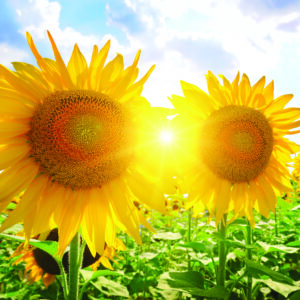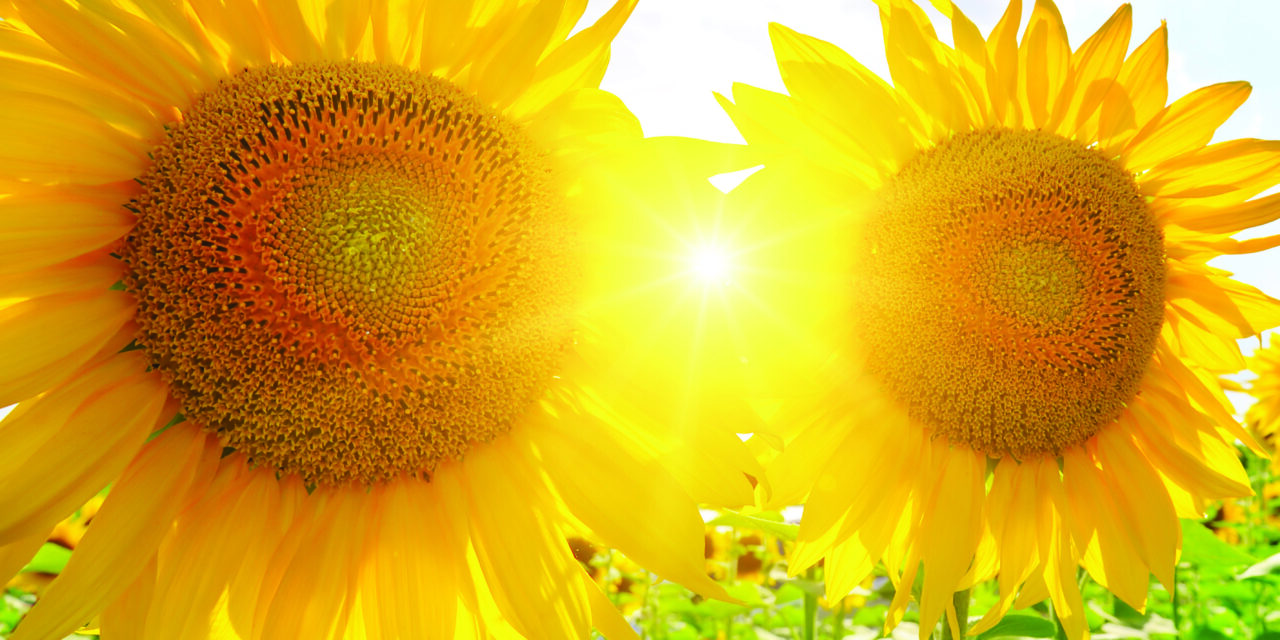Sunflowers are undoubtedly one of the most loved flowers out there.
Even those with limited plant knowledge can identify them and they appear everywhere from kitchen decor to inspirational quote backgrounds to tattoos to accessorizing the blushing bride on wedding day.

Who doesn’t love a yellow petaled flower that reminds us of the glowing sun itself?
But sunflowers offer so many more benefits than simply being a mood booster.
Aside from being good for a spittin’ contest to impress your loved ones, sunflower seeds have nutritional value as well.
Small but mighty, the salty and nutty seeds offer a punch of vitamin C, Vitamin E and magnesium.
Less popularly known, they are also a source of beta-carotene which helps your skin not be as sensitive to the sun (though you’ll still want to put on sunscreen).
To unleash the benefits, enjoy them as a snack on their own or add crunch and texture to salads or saute in veggie dishes.
For another sunny addition to your dishes, add a sprinkle of vibrant yellow petals as they too are edible.
Sunflower oil also carries some of the nutritional benefits of the seeds and is one of the most popular commercial cooking oils, especially for light and airy potato chips.
However, health experts warn it’s not the absolute healthiest cooking oil choice due to low oxidative stability so it’s important to do research for your own health priorities.
Looking to make your own complexion and hair sunny as a sunflower? Sunflower oil is an option for beauty products you can whip up at home or find on a store shelf.
It can be used on it’s own as an antioxidant rich facial oil or moisturizer for your face and neck or as a substitute for more popular almond or jojoba oils in compounds.
What it does for your face it can also do for your hair, as a good frizz tamer and moisturizer on strands either lightly brushed through or applied heavily and rinsed as a deep conditioning treatment.
With such enviable sunny color, sunflower petals are also a popular candidate for natural dyes.
With so many shades of yellows and even into oranges and burgundies, the petals offer popular hues for yarns and fabrics.
They also are easily dried and make a pretty addition to homemade potpourri or added to a wreath, though you’ll want to experiment with smaller head sizes that hold their seeds better.
Outside of the home the sunflowers continue to do their part.
They make a good garden mate as well in a number of ways.
Their strong stalks can act as a trellis for any climbing varieties you may have like beans, peas and more.
Want to grow some shade loving plants but your garden is in full sun? Create functional yet pretty shade with a row of sunflowers in the area you will have the plants, just be sure not to shade out your other sun lovers.
Sunflowers will also lure bees, butterflies and other pollinators to your garden with their nectar and pollen.
Even bats have been known to nibble on sunflowers.
Also benefiting from the seeds are your backyard birds. Try gathering up the heads and drying them to toss for the birds when food is scarce.
You can either remove the seeds or even store entire heads to toss out in the winter months. Leave a few inches of stem so full heads can easily be strung to limbs as a regular bird feeder would to prevent moisture.
Depending on the variety you choose to grow, each plant can produce up to 1,000 seeds
If you’ve ever been impressed at how many farmers love sunflowers so much they plant a whole acre of them, there is an ulterior motive- dove hunting!
The wizened stalks make a good hideout for dove hunters when the season comes in September.
Probably one of their biggest and lesser-known powers of all is phytoremediation, or removal of toxins to include metals, pesticides, gasoline and other harmful chemicals.
When planted in the damaged grounds, they suck the toxins up and into their stalk and leaves. If intending to use this technique, you’ll need to remove the plants at the end of growth to prevent them decomposing back into the soil.
Surely the other flowers in your garden have flashbacks to another golden hued all-star, though instead of “Marcia, Marcia, Marcia” it’s “sunflowers, sunflowers, sunflowers.”
It’s hard to not be jealous of a plant with so many powers.




